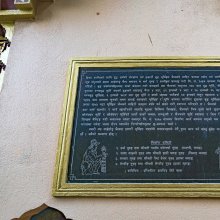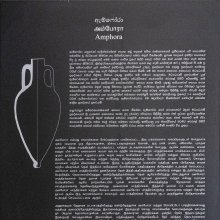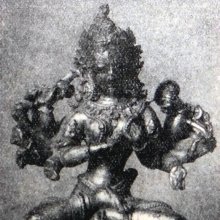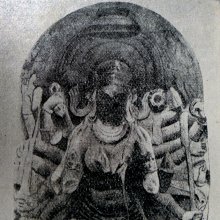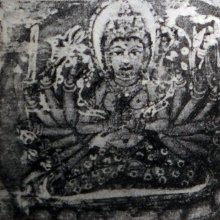Mari, Mārī, Māri, Māṟi: 23 definitions
Introduction:
Mari means something in Buddhism, Pali, Hinduism, Sanskrit, Marathi, Jainism, Prakrit, Hindi, biology, Tamil. If you want to know the exact meaning, history, etymology or English translation of this term then check out the descriptions on this page. Add your comment or reference to a book if you want to contribute to this summary article.
Images (photo gallery)
In Hinduism
Purana and Itihasa (epic history)
Source: Wisdom Library: The Matsya-purāṇaMārī (मारी) is the name of a mind-born ‘divine mother’ (mātṛ), created for the purpose of drinking the blood of the Andhaka demons, according to the Matsya-purāṇa 179.8. The Andhaka demons spawned out of every drop of blood spilled from the original Andhakāsura (Andhaka-demon). According to the Matsya-purāṇa 179.35, “Most terrible they (e.g., Mārī) all drank the blood of those Andhakas and become exceedingly satiated.”
The Matsyapurāṇa is categorised as a Mahāpurāṇa, and was originally composed of 20,000 metrical verses, dating from the 1st-millennium BCE. The narrator is Matsya, one of the ten major avatars of Viṣṇu.
Source: Cologne Digital Sanskrit Dictionaries: The Purana IndexMārī (मारी).—A mind-born mother.*
- * Matsya-purāṇa 179. 15.

The Purana (पुराण, purāṇas) refers to Sanskrit literature preserving ancient India’s vast cultural history, including historical legends, religious ceremonies, various arts and sciences. The eighteen mahapuranas total over 400,000 shlokas (metrical couplets) and date to at least several centuries BCE.
Kavya (poetry)
Source: OpenEdition books: Vividhatīrthakalpaḥ (Kāvya)Māri (मारि) in Prakrit refers to a “husband”, while in Sanskrit it refers to “epidemic, scourge” (considered as a test or a punishment inflicted by any deity), as is mentioned in the Vividhatīrthakalpa by Jinaprabhasūri (13th century A.D.): an ancient text devoted to various Jaina holy places (tīrthas).—Cf. vikr and magical creation.

Kavya (काव्य, kavya) refers to Sanskrit poetry, a popular ancient Indian tradition of literature. There have been many Sanskrit poets over the ages, hailing from ancient India and beyond. This topic includes mahakavya, or ‘epic poetry’ and natya, or ‘dramatic poetry’.
Ayurveda (science of life)
Nighantu (Synonyms and Characteristics of Drugs and technical terms)
Source: WorldCat: Rāj nighaṇṭuMari in the Gujarati language refers to Marica, a medicinal plant identified with Piper nigrum Linn. or “black pepper” from the Piperaceae or “pepper” family of flowering plants, according to verse 6.30-32 of the 13th-century Raj Nighantu of the 13th-century Raj Nighantu or Rājanighaṇṭu.—The sixth chapter (pippalyādi-varga) of this book enumerates ninety-five varieties of plants obtained from the market (paṇyauṣadhi). Other than the Gujarati word Mari, there are more synonyms identified for this plant among which seventeen are in Sanskrit.

Āyurveda (आयुर्वेद, ayurveda) is a branch of Indian science dealing with medicine, herbalism, taxology, anatomy, surgery, alchemy and related topics. Traditional practice of Āyurveda in ancient India dates back to at least the first millenium BC. Literature is commonly written in Sanskrit using various poetic metres.
In Buddhism
Tibetan Buddhism (Vajrayana or tantric Buddhism)
Source: archive.org: The Indian Buddhist IconographyMārī (मारी) refers to one of the twelve Dhāriṇīs according to the 11th-century Niṣpannayogāvalī of Mahāpaṇḍita Abhayākara.—Dhāriṇī is a peculiar kind of Buddhist literature which is supposed to generate great mystic power if repeated continually for a long time. They are short works mostly composed of meaningless syllables, sometimes revealing traces of a language now defunct. [...] The deification of books is not unknown in Buddhism. [...] The Niṣpannayogavālī acknowledges altogether twelve Dhāriṇī (viz., Mārī) deities and gives their descriptions. These Dhāriṇīs look alike when represented and they are usually two-armed, holding the Viśvavajra in the right hand and their special symbols in the left.
Mārī is described in the Niṣpannayogāvalī (dharmadhātuvāgīśvara-maṇḍala) as follows:—
“Mārī is reddish-white in colour and holds in her left hand the needle with string”.
[Her Colour is white; her Symbol is the needle and string; she has two arms.—When conceived in the form of deities, the Dhāriṇīs (viz., Mārī) are endowed with one face and two arms. They all hold in their right hand the double thunderbolt or the viśvavajra, while in the left they carry their own special symbols.]

Tibetan Buddhism includes schools such as Nyingma, Kadampa, Kagyu and Gelug. Their primary canon of literature is divided in two broad categories: The Kangyur, which consists of Buddha’s words, and the Tengyur, which includes commentaries from various sources. Esotericism and tantra techniques (vajrayāna) are collected indepently.
Biology (plants and animals)
Source: Wisdom Library: Local Names of Plants and DrugsMari in the Garo language is the name of a plant identified with Spatholobus parviflorus (DC.) Kuntze from the Fabaceae (Pea) family having the following synonyms: Butea parviflora, Spatholobus roxburghii, Butea sericophylla. For the possible medicinal usage of mari, you can check this page for potential sources and references, although be aware that any some or none of the side-effects may not be mentioned here, wether they be harmful or beneficial to health.
Mari in the Hindi language is the name of a plant identified with Caryota urens Caryota urens L. from the Arecaceae (Palm) family.
Source: Google Books: CRC World Dictionary (Regional names)1) Mari in India is the name of a plant defined with Acer caesium in various botanical sources. This page contains potential references in Ayurveda, modern medicine, and other folk traditions or local practices It has the synonym Acer giraldii Pax (among others).
2) Mari is also identified with Carum copticum It has the synonym Carum copticum Benth. & Hook.f. (etc.).
3) Mari is also identified with Caryota urens It has the synonym Caryota urens Blanco (etc.).
4) Mari is also identified with Desmodium laxiflorum It has the synonym Meibomia laxiflora (DC.) Kuntze (etc.).
5) Mari is also identified with Spatholobus parviflorus It has the synonym Butea parviflora Roxb. (etc.).
6) Mari is also identified with Spondias pinnata It has the synonym Poupartia pinnata (L.f.) Blanco (etc.).
7) Mari in Nigeria is also identified with Sorghum bicolor It has the synonym Holcus cernuus Ard. (etc.).
Example references for further research on medicinal uses or toxicity (see latin names for full list):
· Ethnobotanical Leaflets (2006)
· Flora Indica (1832)
· Journal of Acupuncture and Meridian Studies (2009)
· Species Plantarum. (1802)
· Genera Plantarum (1789)
· Taxon (2001)
If you are looking for specific details regarding Mari, for example health benefits, extract dosage, chemical composition, side effects, diet and recipes, pregnancy safety, have a look at these references.

This sections includes definitions from the five kingdoms of living things: Animals, Plants, Fungi, Protists and Monera. It will include both the official binomial nomenclature (scientific names usually in Latin) as well as regional spellings and variants.
Languages of India and abroad
Pali-English dictionary
Source: BuddhaSasana: Concise Pali-English Dictionarymari : (aor. of marati) died.

Pali is the language of the Tipiṭaka, which is the sacred canon of Theravāda Buddhism and contains much of the Buddha’s speech. Closeley related to Sanskrit, both languages are used interchangeably between religions.
Marathi-English dictionary
Source: DDSA: The Molesworth Marathi and English Dictionarymarī (मरी).—f (maraka S) Epidemic disease, a pestilence. 2 (maraṇēṃ) Dying or extremely sick state. Ex. mājhī āī marīsa ālī.
Source: DDSA: The Aryabhusan school dictionary, Marathi-Englishmarī (मरी).—f A pestilence. Dyiag state.
Marathi is an Indo-European language having over 70 million native speakers people in (predominantly) Maharashtra India. Marathi, like many other Indo-Aryan languages, evolved from early forms of Prakrit, which itself is a subset of Sanskrit, one of the most ancient languages of the world.
Sanskrit dictionary
Source: DDSA: The practical Sanskrit-English dictionaryMāri (मारि).—f. [mṛ-ṇic-ini]
1) A pestilence, plague; दुर्भिक्षमार्यरिष्टानि (durbhikṣamāryariṣṭāni) Bhāgavata 1.56.11.
2) Killing, ruin.
Derivable forms: māriḥ (मारिः).
--- OR ---
Mārī (मारी).—
1) Plague, pestilence, an epidemic.
2) Pestilence personified (the goddess presiding over plagues and identified with Durgā).
Source: Cologne Digital Sanskrit Dictionaries: Edgerton Buddhist Hybrid Sanskrit DictionaryMāri (मारि).—f. (Sanskrit māri, and Lex. māri; AMg. both), plague, pestilence: mārir utsṛṣṭā Divyāvadāna 578.23.
Source: Cologne Digital Sanskrit Dictionaries: Shabda-Sagara Sanskrit-English DictionaryMāri (मारि).—f. (-riḥ-rī) 1. Killing. 2. Ruin. 3. Plague, epidemic. E. mṛ to die, causal form, i aff.: see māra and mārī .
Source: Cologne Digital Sanskrit Dictionaries: Benfey Sanskrit-English DictionaryMāri (मारि).— (vb. mṛ), f. 1. Killing. 2. Plague.
Source: Cologne Digital Sanskrit Dictionaries: Monier-Williams Sanskrit-English Dictionary1) Marī (मरी):—See kara-marī.
2) Mārī (मारी):—[from māra] a f. killing, slaughter, [Prasannarāghava]
3) [v.s. ...] pestilence (also personified as the goddess of death and identified with Durgā), [Atharva-veda.Pariś.; Kathāsaritsāgara; Purāṇa]
4) Māri (मारि):—[from māra] f. death, pestilence, [cf. Lexicographers, esp. such as amarasiṃha, halāyudha, hemacandra, etc.] (also = māraka mn.)
5) [v.s. ...] small-pox, [cf. Lexicographers, esp. such as amarasiṃha, halāyudha, hemacandra, etc.]
6) [v.s. ...] killing, slaying, [cf. Lexicographers, esp. such as amarasiṃha, halāyudha, hemacandra, etc.]
7) [v.s. ...] rain, [cf. Lexicographers, esp. such as amarasiṃha, halāyudha, hemacandra, etc.]
8) Mārī (मारी):—b See under māra.
Source: Cologne Digital Sanskrit Dictionaries: Yates Sanskrit-English DictionaryMāri (मारि):—(riḥ) 2. f. Death; ruin; plague.
Source: DDSA: Paia-sadda-mahannavo; a comprehensive Prakrit Hindi dictionary (S)Māri (मारि) in the Sanskrit language is related to the Prakrit words: Māri, Mārī.
[Sanskrit to German]
Sanskrit, also spelled संस्कृतम् (saṃskṛtam), is an ancient language of India commonly seen as the grandmother of the Indo-European language family (even English!). Closely allied with Prakrit and Pali, Sanskrit is more exhaustive in both grammar and terms and has the most extensive collection of literature in the world, greatly surpassing its sister-languages Greek and Latin.
Hindi dictionary
Source: DDSA: A practical Hindi-English dictionaryMārī (मारी):—(nf) see [mahāmārī].
...
Prakrit-English dictionary
Source: DDSA: Paia-sadda-mahannavo; a comprehensive Prakrit Hindi dictionary1) Māri (मारि) in the Prakrit language is related to the Sanskrit word: Māri.
2) Māri (मारि) also relates to the Sanskrit word: Mārin.
3) Mārī (मारी) also relates to the Sanskrit word: Mārī.
Prakrit is an ancient language closely associated with both Pali and Sanskrit. Jain literature is often composed in this language or sub-dialects, such as the Agamas and their commentaries which are written in Ardhamagadhi and Maharashtri Prakrit. The earliest extant texts can be dated to as early as the 4th century BCE although core portions might be older.
Kannada-English dictionary
Source: Alar: Kannada-English corpusMari (ಮರಿ):—
1) [noun] a young one of an animal.
2) [noun] a very young child; a baby; an infant.
3) [noun] a snake or serpent.
4) [noun] a sheep, ram, goat, etc. meant to be sacrificed to propiate a deity.
5) [noun] that which is small.
6) [noun] the state or period of being an infant; infancy.
7) [noun] a heir-nominate of the pontiff a Vīraśaiva muth or monastery:.
--- OR ---
Maṟi (ಮಱಿ):—
1) [noun] a young one of an animal.
2) [noun] a very young child; a baby; an infant.
3) [noun] a snake or serpent.
4) [noun] a sheep, ram, goat, etc. meant to be sacrificed to propiate a deity.
5) [noun] that which is small.
6) [noun] the state or period of being an infant; infancy.
7) [noun] a heir-nominate of the pontiff a Vīraśaiva muth or monastery:.
--- OR ---
Māri (ಮಾರಿ):—
1) [adjective] large; very big.
2) [adjective] evil; corrupt; base; wicked.
3) [adjective] causing fear; terrible; frightening; gruesome.
--- OR ---
Māri (ಮಾರಿ):—
1) [noun] the act of killing gruesomely.
2) [noun] cessation of life; death.
3) [noun] something that causes fatal injury; an instance of being fatally injured.
4) [noun] any of several epidemic diseases as plague, cholera, etc. that spreads rapidly and causes death in a large scale.
5) [noun] a petty goddess who is believed to cause these diseases.
6) [noun] the goddess of death.
7) [noun] (myth.) destruction of all living beings at the time of Great Deluge (i.e. at the time of destruction of the universe).
8) [noun] (fig.) harm; hazard; jeopardy.
9) [noun] the tree Grewia rotundifolia ( = G. orbiculata) of Tiliaceae family.
--- OR ---
Mārī (ಮಾರೀ):—[verb] to pay in return or give something for having received something.
Kannada is a Dravidian language (as opposed to the Indo-European language family) mainly spoken in the southwestern region of India.
Tamil dictionary
Source: DDSA: University of Madras: Tamil LexiconMari (மரி) [marital] 4 intransitive verb < mṛ. See மரி²-. [mari²-.] எய்தானம் மான்மரிய வேந்திழைக்காய் [eythanam manmariya venthizhaikkay] (நாலாயிர திவ்யப்பிரபந்தம் இயற். [nalayira thivyappirapandam iyar.] 3, 52).
--- OR ---
Mari (மரி) [marittal] 11 intransitive verb < idem. To die; சாதல். அரயன் உடையான் மரித்தமையில் [sathal. arayan udaiyan marithamaiyil] (S. I. I. ii, 311).
--- OR ---
Mari (மரி) [marittal] 11 intransitive verb < smṛ. To remember, meditate; நினைத்தல். [ninaithal.] (W.)
--- OR ---
Mari (மரி) noun < Latin Maria. The Virgin Mary; இயேசுநாதரின் தாயான கன்னி மரியம்மாள். மரியே வாழ்க. [iyesunatharin thayana kanni mariyammal. mariye vazhka.] Roman Cathlic usage
--- OR ---
Mari (மரி) noun See மரிமா. [marima.] (பதார்த்தகுண சிந்தாமணிமேகலை [patharthaguna sindamani] 676.)
--- OR ---
Maṟi (மறி) [maṟital] 4 intransitive verb
1. To be turned upside down; கீழ்மேலாதல். மலைபுரை யானை மறிந்து [kizhmelathal. malaipurai yanai marinthu] (புறப்பொருள்வெண்பாமாலை [purapporulvenpamalai] 7, 9).
2. To return, recede; மீளுதல். (திவா.) மறிதிரை [miluthal. (thiva.) marithirai] (கலித்தொகை [kalithogai] 121).
3. To turn back, retreat; முதுகிடுதல். மைந்தர் மறிய மறங்கடந்து [muthugiduthal. mainthar mariya marangadanthu] (புறப்பொருள்வெண்பாமாலை [purapporulvenpamalai] 6, 14).
4. To fall down; விழுதல். நிழன்மணிப் பன்றி யற்று மறியுமோ [vizhuthal. nizhanmanip panri yarru mariyumo] (சீவகசிந்தாமணி [sivagasindamani] 2201).
5. To bend; சாய்தல். எரிமறிந்தன்ன நாவின் [saythal. erimarinthanna navin] (பத்துப்பாட்டு [pathuppattu] 196).
6. To rise up, as a wave; கிளர்தல். மறிகடல் போன்று [kilarthal. marigadal ponru] (நாலாயிர திவ்யப்பிரபந்தம் இயற். திருவிருத்தம் [nalayira thivyappirapandam iyar. thiruvirutham] 57).
7. To be twisted; முறுக்குண்ணு தல். திரிந்து மறிந்துவீழ் தாடி [murukkunnu thal. thirinthu marinthuvizh thadi] (கலித்தொகை [kalithogai] 15).
8. To go about often; to walk to and fro; பலகாலுந் திரிதல். நயனாடி நட்பாக்கும் வினைவர்போன் மறிதரும் [palagalun thirithal. nayanadi nadpakkum vinaivarpon maritharum] (கலித்தொகை [kalithogai] 46).
9. To be checked, arrested; தடைப்படுதல். [thadaippaduthal.]
10. To be ruined in circumstances; நிலைகுலைதல். ஆம்பன் முகவரக்கன் கிளையொடு மறிய (கல்லாடம் கணபதி. வாழ்.). [nilaigulaithal. amban mugavarakkan kilaiyodu mariya (kalladam kanapathi. vazh.).]
11. To be torn, injured; அறுபடுதல். உன்காது மறியும் [arupaduthal. unkathu mariyum] (நாலாயிர திவ்யப்பிரபந்தம் பெரிய.ாழ். [nalayira thivyappirapandam periyazh.] 2, 3, 6, அரும். [arum.]).
12. cf. மரி-. [mari-.] To die; சாதல். மறிந்த மகன் றனைச்சுட [sathal. marintha magan ranaichuda] (அரிச்சந்திர புராணம் மயான. [arichandira puranam mayana.] 38).
13. To frisk about, gambol; துள்ளுதல். [thulluthal.] Colloq.
--- OR ---
Maṟi (மறி) [maṟittal] 11 transitive verb Causative of மறி¹-. [mari¹-.]
1. To stop, detain, arrest, check; தடுத்தல். மறு பிறப்போட மறித்திடுமே [thaduthal. maru pirappoda marithidume] (திருவாசகம் [thiruvasagam] 36, 2).
2. To turn about; to return; திருப்புதல். [thirupputhal.]
3. To turn upside down, upset; மேல்கீழாக்குதல். [melkizhakkuthal.] (W.)
4. To destroy; அழித்தல். மாகமார் புரங்களை மறித்த மாண்பினர் [azhithal. magamar purangalai maritha manpinar] (தேவாரம் [thevaram] 97, 4).
5. To wave the hand, as an indication of disapproval; தடுத்தற் குறியாகக் கையசைத்தல். மாற்றருங் கரதல மறிக்கு மாது [thaduthar kuriyagak kaiyasaithal. marrarung karathala marikku mathu] (கம்பராமாயணம் உண்டாட். [kambaramayanam undad.] 21).
6. To repeat, double; திரும்பச் செய்தல். [thirumbas seythal.] Local usage
--- OR ---
Maṟi (மறி) noun < மறி¹-. [mari¹-.] [Kanarese, Malayalam: Travancore usage mari.]
1. Young of sheep, horse, deer, etc.; ஆடு குதிரை மான் முதலியவற்றின் இளமை. [adu kuthirai man muthaliyavarrin ilamai.] (தொல். பொ. [thol. po.] 568.)
2. Female of sheep, horse, deer, etc.; ஆடு குதிரை மான் முதலியவற்றின் பெட்டை. (யாழ்ப்பாணத்து மானிப்பாயகராதி) [adu kuthirai man muthaliyavarrin pettai. (yazhppanathu manippayagarathi)]
3. Sheep; ஆடு. மறியுடையாயர் மாதர் [adu. mariyudaiyayar mathar] (கம்பராமாயணம் ஆற்று. [kambaramayanam arru.] 15).
4. Aries of the Zodiac; மேடவிராசி. (சூடாமணிநிகண்டு) [medavirasi. (sudamaninigandu)]
5. Pangolin. See அழுங்கு² [azhungu²],
1. (பிங்கலகண்டு [pingalagandu])
6. Young of pangolin; அழுங்கின் குட்டி. (பிங்கலகண்டு) [azhungin kutti. (pingalagandu)]
7. Deer; மான். (பிங்கலகண்டு) மறிகொள் கையன் [man. (pingalagandu) marigol kaiyan] (தேவாரம் [thevaram] 980, 10).
--- OR ---
Maṟi (மறி) noun < மறி²-. [mari²-.] See மறியல் [mariyal], 1.
--- OR ---
Māri (மாரி) noun probably from வார்-. [var-.] cf. vāri. [Malayalam: Travancore usage māri.]
1. Water; நீர். (பிங்கலகண்டு) [nir. (pingalagandu)]
2. Rain, shower; மழை. (பிங்கலகண்டு) மாரி பொய்ப்பினும் வாரி குன்றினும் [mazhai. (pingalagandu) mari poyppinum vari kunrinum] (புறநானூறு [purananuru] 35).
3. Cloud; மேகம். மாரி மாட் டென்னாற்றுங் கொல்லோ வுலகு [megam. mari mad dennarrung kollo vulagu] (திருக்குறள் [thirukkural], 211).
4. See மாரிக்காலம். மாரி மலைமுழைஞ்சின் மன் னிக் கிடந்துறங்கும் [marikkalam. mari malaimuzhainchin man nig kidanthurangum] (நாலாயிர திவ்யப்பிரபந்தம் திருப்பாவை [nalayira thivyappirapandam thiruppavai] 23).
5. The 20th nakṣatra. See பூராடம். (பிங்கலகண்டு) [puradam. (pingalagandu)]
6. Toddy, liquor; கள். (பிங்கலகண்டு) [kal. (pingalagandu)]
7. A bird; புள்வகை. (பிங்கலகண்டு) [pulvagai. (pingalagandu)]
--- OR ---
Māri (மாரி) noun < māri.
1. Death; மரணம். (பிங்கலகண்டு) [maranam. (pingalagandu)]
2. Small-pox; வைசூரி. (பிங்கலகண்டு) [vaisuri. (pingalagandu)]
3. The Goddess of Small-pox; வைசூரிக்குரிய தேவதை. [vaisurikkuriya thevathai.]
4. Durgā; துர்க்கை. (பிங்கலகண்டு) [thurkkai. (pingalagandu)]
--- OR ---
Māṟi (மாறி) noun < மாறு-. [maru-.] [Old Kanarese māṟaḷi.]
1. One who barters goods; பண்டமாற்றுவோன். [pandamarruvon.] (W.)
2. Double-dealing person; இரண்டகஞ் செய்வோன். [irandagagn seyvon.] (W.)
3. Degree of fineness of gold; பொன்மாற்று. திருக்கண்மலர் இரண்டு ஒன்பதுமாறி [ponmarru. thirukkanmalar irandu onpathumari] (S. I. I. ii, 339).
Tamil is an ancient language of India from the Dravidian family spoken by roughly 250 million people mainly in southern India and Sri Lanka.
See also (Relevant definitions)
Starts with (+247): Maarish, Mari ka jhat, Mari supari, Mari-ammankontati, Mari-lewa, Maria, Maria juana, Maria-preta, Mariabel, Marianga, Mariangi, Mariannas bread-fruit, Maribale, Maribassai, Maribata, Maribbe, Maribe, Maribean, Maribene, Maributa.
Ends with (+339): Aamari, Adikumari, Agacatlumari, Ajagamari, Ajamari, Ajammari, Akamari, Alamari, Alamkumari, Alemari, Alkamari, Almari, Amari, Amgamari, Anapamari, Antumari, Apasmari, Aramari, Arasukumari, Arpamari.
Full-text (+223): Mahamari, Marivyasanavaraka, Marikkal, Marimuttu, Marikkuruvi, Marinal, Mariyammai, Kitamari, Makamari, Marikanutal, Marimalai, Oyamari, Malai-mari-cantai, Mariyullan, Tapamari, Maripatu, Vampamari, Kanci-mariayi, Chal maari, Kaaka maari.
Relevant text
Search found 27 books and stories containing Mari, Maari, Mārī, Marī, Māri, Maṟi, Māṟi; (plurals include: Maris, Maaris, Mārīs, Marīs, Māris, Maṟis, Māṟis). You can also click to the full overview containing English textual excerpts. Below are direct links for the most relevant articles:
Amarakoshodghatana of Kshirasvamin (study) (by A. Yamuna Devi)
Diseases and Impurities < [Chapter 3 - Social Aspects]
Gods and Divinities < [Chapter 4 - Cultural Aspects]
The Religion and Philosophy of Tevaram (Thevaram) (by M. A. Dorai Rangaswamy)
Chapter 4.6 - (b) Symbology of Man (the deer) < [Volume 2 - Nampi Arurar and Mythology]
Chapter 4.6 - (m) Symbology of Fire < [Volume 2 - Nampi Arurar and Mythology]
Chapter 4.6 - (e) Symbology of Malu (the axe) < [Volume 2 - Nampi Arurar and Mythology]
Mari, The Fisherman < [September-October 1931]
Who is Who Among Our Contributors < [January – March, 2002]
Who’s Who < [July – September, 2008]
Diaspora of Bhuta (Daiva) worshipping cult—India and Indonesia (by Shilpa V. Sonawane)
Part 4 - Bhuta Sthana (Shrine) < [Chapter 1 - Introduction]
Chaitanya Bhagavata (by Bhumipati Dāsa)
Verse 3.4.330 < [Chapter 4 - Descriptions of Śrī Acyutānanda’s Pastimes and the Worship of Śrī Mādhavendra]
Verse 2.23.286 < [Chapter 23 - Wandering about Navadvīpa On the Day the Lord Delivered the Kazi]
Verse 2.19.150 < [Chapter 19 - The Lord’s Pastimes in Advaita’s House]
Śrī Kṛṣṇa-vijaya (by Śrī Gunaraja Khan)
Related products
